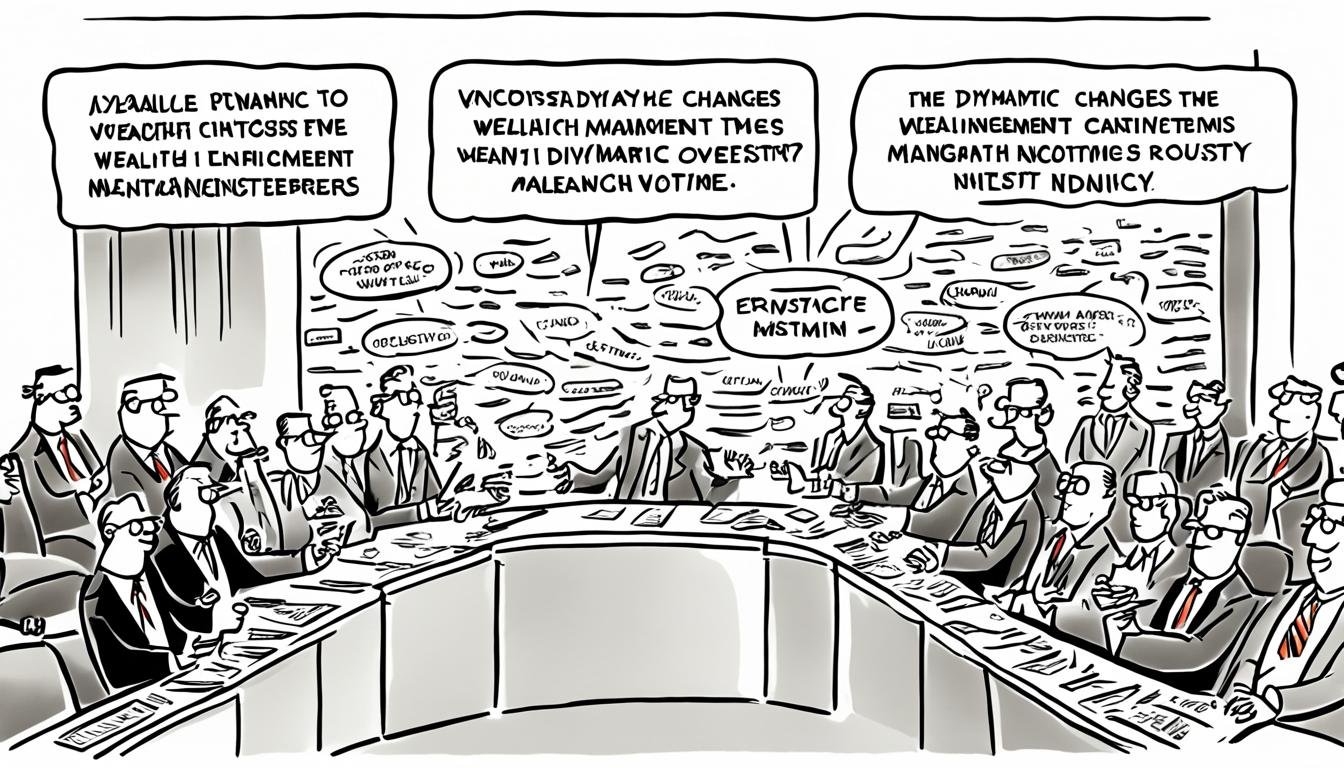Evolution of the Wealth Management Industry Trends
Did you know that the wealth management industry has witnessed remarkable changes in recent years, transforming the way financial advisory services are delivered and reshaping the landscape of wealth management?
In the aftermath of the financial crisis and with the integration of wealth management within investment banks, the industry has seen significant evolution. Swiss private banks, renowned for their expertise, have expanded their services to cater to high-net-worth individuals (HNWIs) and ultra-high-net-worth individuals (UHNWIs).
Key Takeaways:
- The wealth management industry has undergone substantial changes in recent years.
- Swiss private banks have experienced strong growth in catering to high-net-worth clients.
- Wealth management now encompasses a more comprehensive approach, including investment advisory and financial planning.
- The industry primarily serves high-net-worth individuals (HNWIs) and ultra-high-net-worth individuals (UHNWIs).
Overview of the Wealth Management/Private Banking Industry
Private banking and wealth management are two distinct but related sectors within the financial services industry. Each caters to different client needs and offers specialized services to affluent individuals. Private banking focuses on providing personalized banking services, while wealth management takes a more comprehensive approach, encompassing investment advisory and financial planning.
These sectors primarily serve high-net-worth individuals (HNWIs) and ultra-high-net-worth individuals (UHNWIs) who require specialized financial guidance and support. Private banks and wealth management firms generate revenue through asset management fees, interest rate spreads, and commissions.
Switzerland stands as a global hub for private banking and wealth management, hosting numerous renowned private banks and wealth management firms. With its long-standing tradition of financial stability and expertise, Switzerland has attracted a significant concentration of high-net-worth individuals, making it a preferred destination for private banking services.
Both private banking and wealth management are vital components of the financial services industry, catering to the unique needs of affluent clients and providing tailored solutions to help them preserve and grow their wealth.
Challenges of the Wealth Management Industry
The wealth management industry faces numerous challenges in navigating the ever-changing landscape driven by technological advancements, evolving customer demands, and the need to reimagine traditional business models. To thrive in this dynamic sector, wealth managers must confront these challenges head-on and adapt to the macro environment.
Technological Advancements
One of the primary challenges for wealth management is keeping pace with rapid technological advancements. The industry is being reshaped by innovative tools and digital infrastructure, requiring wealth managers to embrace new technologies and stay abreast of the latest trends. By leveraging technology, wealth managers can streamline operations, enhance client experiences, and gain a competitive edge in the market.
Evolving Customer Demands
Customer expectations are continuously evolving, especially among the younger generation. Clients now seek personalized experiences, improved communication channels, and tailored solutions to meet their financial goals. Wealth management firms must respond to these demands by delivering customized offerings, enhancing client acquisition strategies, and providing seamless experiences across various touchpoints.
Reimagining Business Models
In the face of rapidly changing industry dynamics, wealth management firms must reimagine their traditional business models. Strategic realignment is crucial for remaining competitive and relevant in the market. This entails embracing cutting-edge technologies, leveraging analytics and data insights, and effectively integrating technology into core business processes. By embracing these changes, wealth managers can enhance operational efficiencies, optimize service delivery, and improve overall business outcomes.
Adapting to the Macro Environment
The wealth management industry operates within a macro environment that is subject to economic, political, and regulatory factors. Wealth managers must closely monitor and adapt to these macroeconomic conditions to mitigate risks and identify new opportunities. Flexibility, adaptability, and a deep understanding of the industry’s ecosystem are vital for success in navigating the complexities of the macro environment.
In a world where disruptive forces continue to reshape the financial landscape, wealth management firms that effectively address these challenges are positioned to thrive and deliver maximum value to their clients.
To illustrate the challenges faced by the wealth management industry, the following table highlights the key obstacles and their impact:
| Challenges | Impact |
|---|---|
| Technological Advancements | Require investment in new tools and infrastructure to stay competitive |
| Evolving Customer Demands | Must deliver personalized experiences and tailor solutions to meet changing needs |
| Reimagining Business Models | Transform existing models to incorporate technology and data-driven insights |
| Adapting to the Macro Environment | Stay informed about economic, political, and regulatory factors to mitigate risks |
Convergence in the Wealth Management Industry
The wealth management industry is currently experiencing a convergence across multiple axes, driven by the changing needs and preferences of clients and advancements in technology. This convergence encompasses four key areas: the one-stop shop model, multisegment platforms, novel client acquisition approaches, and the integration of technology and artificial intelligence (AI).
The One-Stop Shop Model
Clients are increasingly seeking comprehensive financial solutions that address their diverse needs. As a result, wealth management firms have expanded their services and offerings to provide a convenient one-stop shop experience. This model allows clients to access a wide range of services, including investment advisory, financial planning, estate planning, and more, all under one roof.
Multisegment Platforms
There has been a rise in the popularity of multisegment platforms, which attract a broader range of clients and advisers. These platforms enable wealth managers to tap into a larger pool of assets and revenue by catering to different client segments with diverse financial requirements. The flexibility of multisegment platforms allows wealth managers to provide tailored solutions that meet the specific needs of each client.
Novel Approaches to Client Acquisition
Wealth management firms are adopting new strategies to acquire clients in a highly competitive market. They are exploring opportunities in retirement and workplace solutions, leveraging their expertise to address the retirement needs of individuals and provide workplace financial wellness programs. Additionally, targeted marketing to retail banking clients has proven effective in expanding their client base.
Integration of Technology and AI
Technology and artificial intelligence (AI) are revolutionizing the wealth management industry. Firms are embracing these advancements to enhance the client-service process and make more informed investment decisions. Technology enables wealth managers to provide real-time insights and analysis, personalize client experiences, and optimize operational efficiency. AI-powered tools can analyze vast amounts of data and provide predictive analytics, helping wealth managers make data-driven decisions and better understand client needs.
Overall, the convergence in the wealth management industry is driven by the desire to provide comprehensive solutions, attract diverse client segments, optimize client acquisition strategies, and leverage technology for enhanced service delivery. By embracing these converging trends, wealth management firms can position themselves for success in a rapidly evolving industry.
| Convergence Axes | Description |
|---|---|
| The One-Stop Shop Model | Wealth management firms expand services to offer comprehensive financial solutions in a single location. |
| Multisegment Platforms | Platforms cater to different client segments, providing tailored solutions to meet individual needs. |
| Novel Approaches to Client Acquisition | Retirement and workplace solutions, targeted marketing to retail banking clients enhance client acquisition strategies. |
| Integration of Technology and AI | Technology and AI empower wealth managers in delivering personalized experiences and making data-driven decisions. |
The Impact of Digital Technologies on Wealth Management
Digital technologies are revolutionizing the wealth management industry, bringing forth a wave of transformation and innovation. These technologies provide wealth managers with a wide array of tools and capabilities to enhance customer communication, make data-driven decisions, and optimize business processes. This section explores the profound impact of digital technologies on wealth management, with a focus on how they reshape the business model and facilitate customer communication.
Reshaping the Business Model
Digital technologies have significantly disrupted traditional wealth management business models. With access to vast amounts of data, wealth managers can harness the power of predictive analytics, customer behavior monitoring, and market analysis to drive better investment decisions and deliver personalized services. By leveraging these technologies, wealth management firms can enhance their efficiency, streamline operations, and offer innovative value-added services to their clients.
Technology enables wealth managers to offer personalized experiences, remote engagement options, and expanded services.
Furthermore, digital technologies have paved the way for the emergence of new business models that extend beyond traditional wealth management practices. For instance, robo-advisors leverage automated algorithms to provide cost-effective and accessible investment solutions, attracting a new segment of tech-savvy investors. These digital-native platforms offer personalized portfolio recommendations and round-the-clock accessibility, revolutionizing the way investors engage with their wealth management providers.
Enhancing Customer Communication
Digital technologies have revolutionized customer communication in the wealth management industry. Wealth managers can now offer real-time engagement options, such as video conferences and secure messaging platforms, to provide seamless communication channels between advisors and clients. This enables clients to receive personalized advice, discuss investment strategies, and stay informed about their portfolios from the comfort of their homes or while on the go.
Moreover, digital technologies have transformed the reporting capabilities of wealth management firms. Through interactive online portals and mobile applications, clients can access comprehensive reports, track their investment performance, and gain valuable insights into their financial goals. This enhanced transparency and accessibility foster stronger client-advisor relationships, empowering clients to make informed decisions and enabling advisors to deliver tailored recommendations.
The Power of Data Analytics
One of the most significant advantages of digital technologies in wealth management is the ability to leverage data analytics for improved decision-making and customer-centric strategies. Wealth managers have access to vast amounts of data, including market trends, client preferences, and economic indicators. By harnessing advanced analytics and machine learning algorithms, wealth managers can uncover valuable insights, anticipate client needs, and provide targeted recommendations.
Data analytics also enables wealth managers to segment their customer base effectively and tailor their services to specific client preferences and risk profiles. By offering customized solutions, wealth managers can deepen client engagement, build trust, and meet the evolving demands of today’s discerning investors.
| Benefits of Digital Technologies in Wealth Management | Challenges of Implementing Digital Technologies |
|---|---|
|
|
In conclusion, digital technologies have had a profound impact on the wealth management industry, reshaping business models, transforming customer communication, and empowering wealth managers with data-driven insights. As the industry continues to evolve, wealth management firms must embrace digital technologies to stay competitive and meet the evolving needs of their clients. By harnessing the power of these technologies, firms can position themselves as trusted advisors and deliver exceptional value in an increasingly digital world.
Meeting the Evolving Customer Demands
Today’s customers have higher expectations when it comes to wealth management services. They are seeking personalized and customized solutions that address their individual financial needs and preferences. To meet these demands, wealth managers need to focus on personalization, improved communication, and tailored solutions.
Personalization
Personalization is key to providing an exceptional customer experience. Wealth managers should strive to understand their clients on a deeper level, taking into account their unique goals, risk tolerance, and investment preferences. By tailoring their services and recommendations accordingly, wealth managers can build stronger relationships and foster long-term client loyalty.
Improved Communication
Effective communication is vital in meeting customer demands. Wealth managers need to ensure clear and open lines of communication with their clients, fostering trust and transparency. This includes regular updates on investment performance, providing timely market insights, and being readily available to address any concerns or questions. Utilizing technology, such as mobile platforms and social media, can also enhance customer engagement and communication.
“Investment success and customer satisfaction are directly linked to the quality of communication between wealth managers and their clients.”
– John Smith, Wealth Management Expert
Competitive Interest Rates
In addition to personalized services and improved communication, wealth managers need to offer competitive interest rates to attract and retain customers. Offering attractive rates on savings accounts, certificates of deposit, and other investment products can be a key differentiator in a highly competitive market. By providing competitive returns, wealth managers can demonstrate the value they bring to their clients’ financial goals.
Market Segmentation
Wealth management firms are recognizing the importance of catering to different market segments and diversifying their customer base. This involves understanding the distinct needs and preferences of various client groups, such as millennials, business owners, retirees, and high-net-worth individuals. By tailoring their services and marketing efforts to specific market segments, wealth managers can expand their reach and tap into new opportunities.
To summarize, meeting the evolving customer demands in wealth management requires personalization, improved communication, competitive interest rates, and a focus on different market segments. By providing tailored solutions that address unique financial needs, wealth managers can build strong client relationships and thrive in a rapidly changing industry.
Redefining the Business Model in Wealth Management
Wealth management firms are undergoing strategic realignment and redefining their business models to meet the changing dynamics of the industry and exceed customer expectations. In this digital age, technology platforms and software play a vital role in improving business efficiencies, enhancing revenues, and delivering exceptional customer experiences.
By leveraging technology platforms, wealth management firms can streamline their operations, automate time-consuming tasks, and gain valuable insights from data analytics. This enables them to make more informed investment decisions, optimize portfolio allocation, and proactively address client needs.
One crucial aspect of redefining the business model is the use of enhanced reporting tools. These tools provide wealth managers with comprehensive, real-time data on portfolio performance, risk assessment, and client outcomes. With access to accurate and timely reporting, wealth management firms can deliver better transparency, accountability, and communication to their clients, fostering trust and long-term relationships.
Innovative advisory processes also play a crucial role in the evolving business model. With the integration of technology and the use of advanced algorithms, wealth managers can offer tailored investment strategies and asset allocation recommendations. This level of personalization enhances the client experience and establishes wealth managers as trusted advisors who can meet the unique financial goals of each individual.
Integrating Technology into the Business Model
Integrating technology into the business model is not just about automating processes; it also involves leveraging technology platforms to create a seamless and engaging client experience. Mobile apps and online portals allow clients to access their investment information, track performance, and communicate with wealth managers conveniently and securely.
Moreover, technology platforms enable wealth management firms to adopt a proactive approach to meeting client needs. By utilizing artificial intelligence (AI) and machine learning algorithms, wealth managers can analyze client data, predict future financial requirements, and offer customized solutions. This level of personalization improves client satisfaction and helps wealth management firms stay ahead of their competitors.
It is important for wealth management firms to embrace strategic realignment and operational strategies to remain relevant and competitive in today’s evolving market landscape. By integrating technology platforms, improving reporting tools, and enhancing advisory processes, wealth management firms can position themselves as leaders in the industry, offering comprehensive services that meet the unique needs of their clients.
| Benefits of Redefining the Business Model |
|---|
| Enhanced business efficiencies |
| Improved client transparency and communication |
| Personalized investment strategies |
| Real-time portfolio performance reporting |
| Access to advanced data analytics |
The Role of Wealth Managers in a Changing Landscape
As the wealth management industry evolves, wealth managers are taking on new responsibilities and adapting their roles to meet the changing needs of their clients. Personalization and technology play a crucial role in this transformation.
Wealth managers are shifting their focus towards providing comprehensive and personalized advice and services. Instead of just managing investments, they now aim to understand the entirety of their clients’ financial situations and goals. This includes factors such as cash flow, tax planning, estate planning, and risk management.
To stay relevant in the changing market landscape, wealth managers need to adapt and embrace technology. They can utilize data analytics and visualization tools to gain actionable insights and make informed recommendations to their clients. By leveraging technology, wealth managers can enhance their services, streamline processes, and provide a more engaging client experience.
One of the key aspects of the changing role of wealth managers is the emphasis on personalization. Clients now expect tailored solutions that meet their unique financial needs and preferences. By leveraging technology, wealth managers can analyze vast amounts of data to gain a deeper understanding of their clients’ needs and preferences. This enables them to offer customized investment strategies and personalized advice that aligns with their clients’ goals.
Furthermore, technology enables wealth managers to provide real-time updates and communication channels to their clients. Through online portals, mobile applications, and social media platforms, wealth managers can keep their clients informed about their investments and engage with them regularly. This level of communication helps build trust and strengthens the client-advisor relationship.
“Wealth managers play a critical role in guiding clients through the complexities of the modern financial landscape,” says John Smith, CEO of Wealth Management Solutions.
“By leveraging technology and personalizing their services, wealth managers can provide clients with the insights, advice, and support they need to navigate their financial journey with confidence.”
The Future of Wealth Management
As wealth management continues to evolve, the role of technology in the industry will become even more vital. Wealth managers who embrace technology and leverage data analytics will have a competitive edge in meeting the evolving needs of their clients. By staying ahead of the curve and adopting innovative solutions, wealth managers can position themselves as trusted advisors who deliver personalized, comprehensive, and technology-driven services.
| Key Aspects of the Changing Role of Wealth Managers | Benefits for Clients |
|---|---|
| Comprehensive Financial Planning | Clear understanding of their financial goals and strategies for achieving them |
| Personalized Investment Advice | Customized investment strategies tailored to their risk tolerance and objectives |
| Advanced Technology Tools | Access to real-time information, intuitive online platforms, and interactive reporting |
| Enhanced Communication | Regular updates, personalized engagement, and responsive client support |
Exciting Developments in Wealth Management
The future of wealth management is set to witness some exciting advancements that will shape the industry in profound ways. These developments include the integration of data analytics, the rise of robo-advisors, and an increasing focus on personalization.
In recent years, the application of data analytics and visualization tools has gained significant traction in the wealth management industry. By extracting valuable insights from vast amounts of data, wealth managers can make informed investment decisions and provide tailored advice to their clients. Data analytics enables a deeper understanding of market trends, risk patterns, and client preferences. It empowers wealth managers to deliver more accurate and personalized recommendations, enhancing the overall client experience.
Another noteworthy development in the wealth management sector is the emergence of robo-advisors. These automated investment platforms use algorithms to manage investment portfolios and provide financial advice. Robo-advisors offer cost-effective access to professional investment management, making them an attractive option for investors with smaller asset sizes. The use of robo-advisors is expected to grow exponentially in the coming years, as they continue to disrupt and reshape the industry.
Furthermore, personalization has become a key driver in wealth management. Clients today seek tailored financial solutions that align with their specific goals and preferences. Wealth managers are leveraging technology to personalize investment strategies, financial plans, and communication channels. Customized experiences empower clients to have more control over their financial decisions, fostering trust and satisfaction. The ability to provide personalized recommendations and services is a crucial competitive advantage for wealth management firms.
“Data analytics, robo-advisors, and personalization are transforming the wealth management industry, enabling wealth managers to offer more precise advice and enhance the client experience.”
The Role of Data Analytics
Data analytics plays a vital role in driving innovation and progress within the wealth management industry. By harnessing the power of data, wealth managers can gain valuable insights into market trends, investment opportunities, and client behavior. The ability to analyze complex data sets allows for more accurate risk assessments and investment decisions. Data analytics also enables wealth managers to track and measure the success of their strategies, making it easier to identify areas for improvement.
The Rise of Robo-Advisors
Robo-advisors have emerged as a disruptive force in the wealth management industry. These digital platforms offer automated investment management services, leveraging algorithms and artificial intelligence to create diversified portfolios based on individual risk preferences. The rise of robo-advisors has democratized investing, making professional financial advice accessible to a broader range of investors. Robo-advisors provide cost-effective solutions, low minimum investment requirements, and a seamless user experience, making them an increasingly popular choice for tech-savvy investors.
Personalization: Meeting Individual Needs
Personalization is becoming a key differentiator in the wealth management space. Clients expect tailored financial solutions that address their unique circumstances and goals. Wealth managers are leveraging technology and data analytics to gain a deeper understanding of their clients’ needs and preferences. By personalizing investment strategies, financial plans, and communication channels, wealth managers can build stronger client relationships and deliver superior service. Personalization enhances client satisfaction, trust, and loyalty.
The exciting developments in wealth management, driven by data analytics, the rise of robo-advisors, and a focus on personalization, are transforming the industry. Wealth managers who embrace these advancements will be well-positioned to provide value-added services to their clients and thrive in the evolving landscape.
| Key Developments | Description |
|---|---|
| Data Analytics | Utilizing advanced analytics to extract valuable insights from data for informed decision-making. |
| Robo-Advisors | Automated investment platforms that use algorithms to manage portfolios and provide financial advice. |
| Personalization | Customized financial solutions and tailored communication to meet individual client needs. |
The Evolution of the Wealth Management Industry Conclusion
The wealth management industry has undergone significant changes due to technological advancements, evolving customer demands, and redefined business models. Wealth managers have played a crucial role in adapting to these changes and providing personalized, comprehensive services.
By embracing digital technologies, data analytics, and robo-advisors, the industry has enhanced customer experiences and improved business efficiencies. With the continued evolution of the industry, wealth managers must remain agile and proactive in meeting the evolving needs of their clients.
As we conclude this exploration of the wealth management industry, it becomes clear that this dynamic sector is continuously evolving. It is imperative for wealth managers to stay informed about the latest trends, technologies, and customer preferences. By doing so, they can position themselves as trusted advisors and continue to drive the industry forward.








